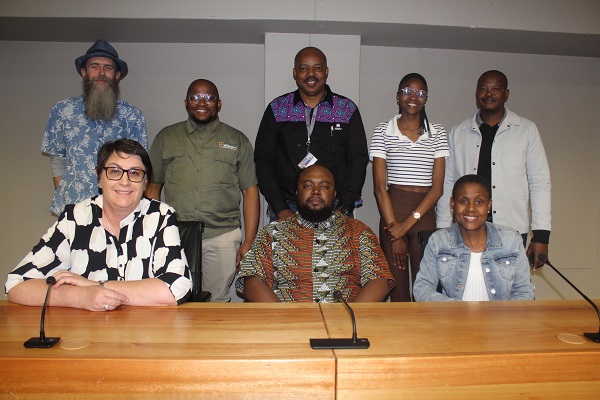On Wednesday, 28 August 2024, the Population and Health research entity at the North-West University (NWU) hosted a public lecture by Dr Jackson Sebola-Samanyanga, senior lecturer in the Department of Town and Regional Planning at the University of Pretoria. The event was held at the Mahikeng Campus and attracted a diverse audience. The aim was to unpack the land question, which continues to be passionately debated in South Africa.
The lecture, titled “Land, Land Reform and (Re)membering our Relationship with land”, provided a platform for discussing the sensitive land question. The North West Department of Land Reform and Rural Development, led by the director for Spatial Planning and Land Use Management (SPLUM), Tukisetso Kopela, and the deputy director for Monitoring and specialist in Provincial Operations Support, Doni Mosimanekgosi, joined the discussions from the government perspective.
In her opening remarks, Prof Mirna Nel, the deputy dean for Research and Innovation in the Faculty of Humanities at the NWU, laid the foundation for the thought-provoking engagements.
In introducing the speaker, the research director for Population and Health, Professor Martin Palamuleni, also from the Faculty of Humanities, said “Universities should be part of those that direct the land issue, as they are the ones producing leaders who spearhead rural development in government and other entities.”
During his address, Dr Sebola-Samanyanga emphasised land use to be a compulsory activity that every household should handle like it was done in the past. Backyard gardens should be established for vegetables, cows should be kept for milk, and goats for meat. “Remembering our relationship with the land will help us to reclaim control of our food systems,” he added.
In conclusion, Dr Molepo highlighted that the land question in South Africa is not merely about hectares and transferring or claims. It is also not only about returning to the idealised past, but about reclaiming and reconstructing our knowledge and histories to empower us to face present and future challenges.
Land reform and our relationship with the land
The lecture also covered the issue of migration to greener pastures on retirement or after retrenchments. Families end up back in their rural villages and if they do not own land there, they are unable to survive because they have no land to work.
Dr Sebola-Samanyanga illustrated how our great-grandparents used to survive just by working the land. He underscored that all households should sustain themselves by keeping chickens for eggs and backyard gardens for vegetables, and not just rely on being able to buy everything.
Prof Mokgadi Molope delivered the vote of thanks, saying that he appreciated the Faculty of Humanities creating platforms for academics and researchers to engage with the public and experts on how we can address issues that we are facing. “This public lecture encouraged us to reflect on our relationship with the land. Through public lectures like this the faculty creates a platform where we can pursue our mission to create space for rigorous debates about how we can address the 21st-century challenges.”
The director of Social Sciences, Dr Andre Goodrich, in his closing remarks challenged universities to really remember and do the work of remembering through more community engagement initiatives.
Margaret Munnerlyn Mitchell, an American novelist and journalist, once said “Land is the only thing in the world that amounts to anything, for it is the only thing in this world that lasts. It is the only thing worth working for, worth fighting for.”

In front, from left to right: Prof Mirna Nel, Dr Jackson Sebola-Samanyanga and Prof Mokgadi Molope.At the back, from left to right: Dr Andre Goodrich, Doni Mosimanekgosi, Dr Buti Kumpi, one of the student attendees, and Tukisetso Kopela.
